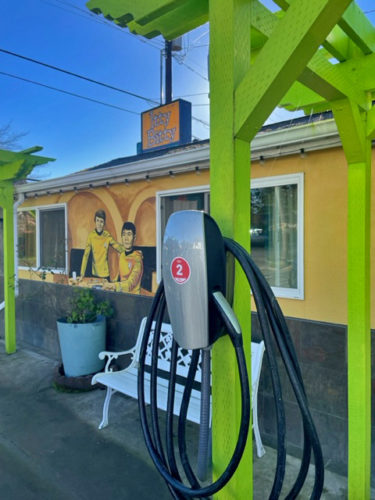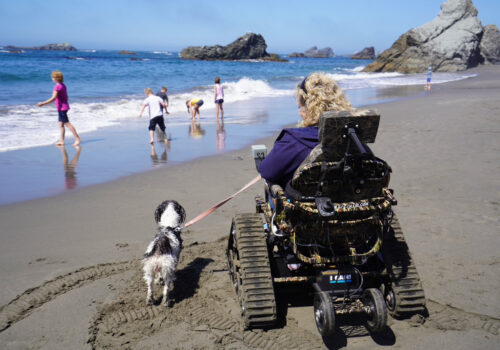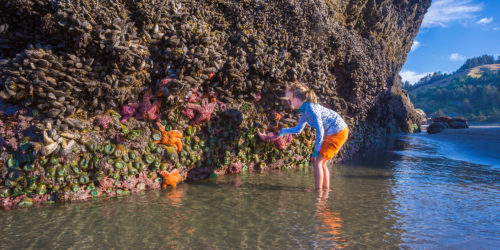- Welcome
- Public Affairs
- Planning Documents
- OCVA Team
- Marketing Resources
- Marketing Tools
- Event Submissions
- Travel Stories
- Business Resources
- Grant Opportunities
- Google Business Profile
- Workforce Training
- Connect
- Newsletter Sign Up
- Industry News
- Job Opportunities
- Emergency Response
- In the Media
- Industry Events
- North Coast Tourism Management Network
- Stewardship
- Travelabilty
- Resiliency Dashboard
- Strategic Advisory Group
- Volunteer Opportunities
- Transportation
EV Planning & Partner Resourcing
 As part of our work to encourage a lower carbon footprint for visitors, the Oregon Coast Visitors Association (OCVA) is advancing a critical project to enhance EV charging infrastructure along the Oregon Coast. Funded by Pacific Power’s E-Mobility Grant Program and in collaboration with Parametrix, the initiative focuses on evaluating and addressing current EV charging needs in Clatsop County, Lincoln City, Coos Bay, and along key highways. This project is vital for closing existing gaps and ensuring that day and overnight travelers have reliable access to EV charging stations. Additionally, installing EV charging stations at key locations can increase visitor traffic to strategic places; ie: the ports, where visitors can be encouraged to shop the docks, or explore other less frequented areas.
As part of our work to encourage a lower carbon footprint for visitors, the Oregon Coast Visitors Association (OCVA) is advancing a critical project to enhance EV charging infrastructure along the Oregon Coast. Funded by Pacific Power’s E-Mobility Grant Program and in collaboration with Parametrix, the initiative focuses on evaluating and addressing current EV charging needs in Clatsop County, Lincoln City, Coos Bay, and along key highways. This project is vital for closing existing gaps and ensuring that day and overnight travelers have reliable access to EV charging stations. Additionally, installing EV charging stations at key locations can increase visitor traffic to strategic places; ie: the ports, where visitors can be encouraged to shop the docks, or explore other less frequented areas.
For long-term planning, OCVA is committed to developing a comprehensive strategy that addresses regional travel patterns, energy requirements, and future demand. This approach includes engaging with local governments, stakeholders, and private sector partners to create a cohesive plan that spans multiple jurisdictions. By integrating travel-demand modeling and strategic energy deployment, OCVA aims to build a robust and sustainable EV charging network that supports the growing needs of coastal travelers.
Location
Ultimately, the goal of this project is to stimulate coastwide investment in charging infrastructure needed to meet growing residential and traveler demand. Currently, our planning efforts have been focused in Clatsop, Coos and Lincoln County, but we are seeking grants to expand our scope of work to the entire Oregon coast.
Key Partners
- ODOT
- ODOE
- FORTH
- Pacific Power
- Tillamook PUD
- Bandon Dunes Charitable Foundation
- Travel Oregon
How it all comes together
See how this project aligns with the Glasgow Declaration – a global commitment by tourism stakeholders to address climate change – and its key principles.

- Transportation emissions are one of the highest tourism emissions. With ½ the lifetime CO2e emissions of gas-powered vehicles, a transition Electric Vehicle travel is a key carbon reduction strategy for tourism.
- We are engaged in high level planning to understand EV charging needs along the Oregon Coast.

Transportation emissions are one of the highest tourism emissions. With ½ the lifetime CO2e emissions of gas-powered vehicles, a transition Electric Vehicle travel is a key carbon reduction strategy for tourism.

Electric Vehicles do not leave exhaust particulate matter, like gas-powered vehicles, reducing environmental and health impacts of vehicles along the coast.

- These projects pull in a number of partners – from funding to local planning.
- We have worked with ODOT, ODOE, FORTH, Parametrix, Pacific Power, Tillamook PUD, Bandon Dunes Charitable Foundation, and Travel Oregon in order to make the project a reality.

These projects are funded through a variety of mechanisms:
- Environmental Justice Collaborative Problem Solving Program Grant Funds from the EPA
- Pacific Power’s E-mobility Grant Fund
- RCTP Funds
- National Renewable Energy Laboratory Grant Funds
- ODOT Community Charging Rebate Program
- Bandon Dunes Charitable Foundation

Access to publicly available chargers is important for visitors who do not have single family homes, who are renting EVs, or who are driving lower-cost EVs that will require more publicly available charging.



